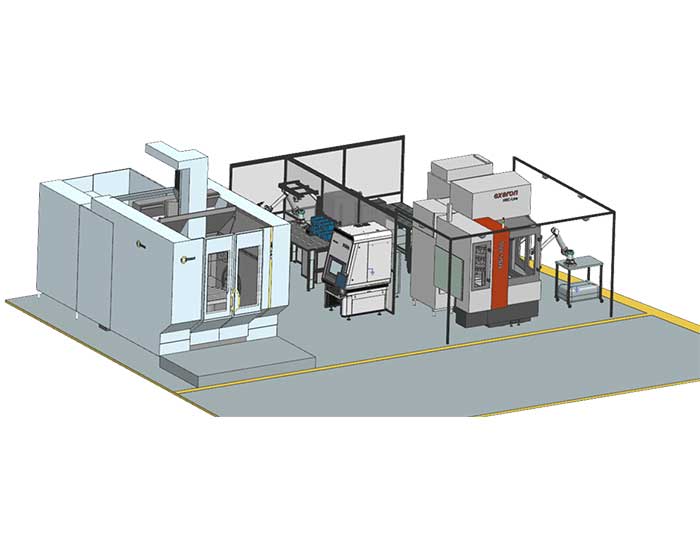The four Fraunhofer institutes – Fraunhofer FOKUS, Fraunhofer HHI, Fraunhofer IPK, and Fraunhofer IZM – have been cooperating under the umbrella of the Berlin Center for Digital Transformation since 2017, pooling their expertise in the fields of information and communication technologies (ICT), Cloud based infrastructure solutions, man-machine controls, highly robust sensor systems for industry and production and critical infrastructure and mobility.
The management of the Center is carried out by a single office, the chairmanship of which rotates every two years among the participating institutes. Since the beginning of 2023, Dr. Maik Hampicke, a business unit developer at Fraunhofer IZM, has been head of the Berlin Center for Digital Transformation office.
RealIZM spoke with the new head of the office about the Center’s successes achieved so far, future plans, and the advantages of pooling know-how on the use of digitization solutions in production from different institutes.
The Fraunhofer concept of high-performance centers offers the federal and state governments a way of ensuring continued innovation and exploitation-oriented excellence in key topics to maintain the competitiveness of the German industry. Currently, there are a total of 21 Fraunhofer high-performance centers. The Berlin Center for Digital Transformation aims to support companies with practical solutions and technologies in digital networking and transformation.
To this end, the participating institutes have established so-called transfer centers that develop and test solutions for 5G, Industry 4.0, the Internet of Things and Cyber Physical Systems (CPS) before transferring them back to the industry.
- At Fraunhofer IZM’s Transfer Center “Hardware for Cyber Physical Systems (CPS)”, project partners can realize precisely tailored sensors and actuators for their digitization projects. Innovators and developers benefit from Fraunhofer IZM’s modular sensor kit, which allows hardware prototypes to be tested and further developed quickly and easily.
- Under the direction of Fraunhofer HHI, infrastructure is being created in Berlin for development and testing based on the 5th-generation mobile communications standard. With the help of its partners, the task of the Transfer Center “5G Technologies” is to bring results from ongoing 5G research into experimental testing in order to make a significant contribution to the development and standardization of 5th-generation mobile networks.
- At the Internet of Things (IoT) Transfer Center at Fraunhofer FOKUS, users, manufacturers, and interested parties can develop IoT strategies, e.g., for production facilities and logistics companies. Furthermore, they can experience and test IoT systems and applications ranging from smart cities and the healthcare sector to application solutions for the consumer and media sectors.
- The Industry 4.0 Transfer Center at Fraunhofer IPK brings together providers from the fields of information and communication technology and automation equipment suppliers with the manufacturing industry. Together, digitization solutions and customer-specific implementation concepts are developed here, from virtual product development to production planning and control to collaboration with business partners.
Who is Berlin Center for Digital Transformation’s offer aimed at?
Dr.-Ing. Maik Hampicke: The Berlin Center for Digital Transformation supports the German economy and companies from start-ups to medium-sized businesses to large corporations, especially in the Berlin-Brandenburg region, in realizing the potential of digitization and securing their competitiveness and performance in the digital world. Our cooperation partners do not necessarily have to come from the region: We are generally open to inquiries from around the world and examine whether and how we, as a high-performance center, can help with the issues in question on a case-by-case basis.
On the one hand, we are a central point of contact for the industry on the subject of digital transformation. On the other, the Berlin Center for Digital Transformation is also an important platform for internal networking and better pooling of the technical expertise of the participating research institutions across projects.
What results can the Berlin Center for Digital Transformation show so far?
Dr.-Ing. Maik Hampicke: With the Berlin Center for Digital Transformation, the four participating Fraunhofer institutes offer research and implementation expertise on the Internet of Things and Industry 4.0 from a single source. Our industrial partners benefit from the latest basic and cross-sectional technologies that focus on microelectronics for sensors and actuators, Fog, Edge, and Cloud-based networking platforms, knowledge-based data analysis in real-time, and automation of cooperative value creation processes.
Since the existence of the Berlin Center for Digital Transformation, many different industrial and public projects have been initiated. Currently, we are working together with Berlin Partner on an EU project that aims to implement digitization technologies for SMEs from the railroad technology sector
Our most recent project highlights include the development of a demonstrator for digital networking in the industrial environment using the example of automated fuel cell production and the training concepts based on the “Software-Defined 5G Factory” for joint marketing. In the project on the networked autonomous production line, numerous technologies developed within the Berlin Center for Digital Transformation were used e.g., visible light communication, sensor-actuator platform for industrial applications, XR-based interaction technologies, autonomous AGVs, and AI-based quality control or the digital twin.

Schematic Design for the Demonstrator – Digitization Solutions in Production Technology – Manufacturing of a Fuel Cell, Image: Fraunhofer IPK
At the Fraunhofer-Gesellschaft Think Tank Awards at the Hannover Messe 2019, the Berlin Center for Digital Transformation exhibit was awarded third place. With our exhibit and the slogan “Light up your Production”, we demonstrated how digital networking using optical wireless technology can efficiently serve the high demands in the industrial environment.
How is the success of the Berlin Center for Digital Transformation measured?
Dr.-Ing. Maik Hampicke: The success of our activities is measured using various key performance indicators (KPIs). These include, among others, the topics of spin-offs, standardization, continuing education, infrastructure services, and science communication. Our services are not limited to purely scientific support of projects. Rather, it is about transforming results into practice.
In my experience, the concept of joint project collaboration in the Berlin Center for Digital Transformation works really well – both on the technical and communicative levels. We have repeatedly experienced a very fruitful dialog between the participating institutes and the partners. Each actor has the chance within the framework of our projects to do what they do best. This expertise is shared and discussed within the group. There is a great advantage in networking and the exchange of knowledge, from which all of the contributors benefit.
The Berlin Center for Digital Transformation is funded by the Fraunhofer Institute the Governing Mayor of Berlin, the Senate Chancellery for Science and Research.
Let’s look to the future: What milestones can we expect from the Berlin Center for Digital Transformation under the leadership of Fraunhofer IZM?
Dr.-Ing. Maik Hampicke: One focus of the four Fraunhofer institutes involved is the construction of a demonstrator for networked autonomous production lines and the development of a seminar program specifically on this topic. We plan to present this exhibit at the Hannover Messe 2024.
In November 2023, we will be present at the Smart Country Convention in Berlin with our own booth. In addition, we will probably also participate in the MikroSystemTechnik Congress in Dresden.
If anyone is interested in becoming a practice partner or in a joint collaboration, we are always available to answer questions and provide further information. Contact the Berlin Center for Digital Transformation.





Add comment